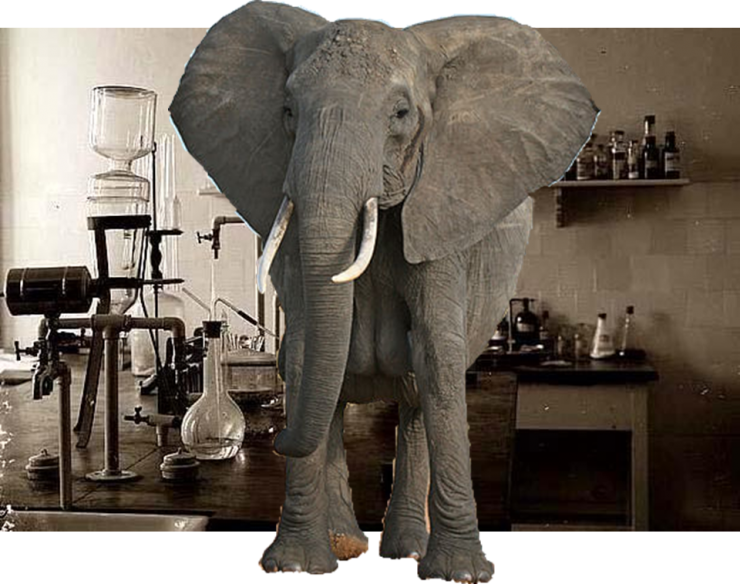Some say they were pursued by the Hound of Heaven, a Grace that would not take leave, not in the “nights”or “down the days,” the “arches of the years” or the “labyrinthine ways.” That poetry never much resonated with me. The first time I heard it I wondered, “At what rate did he travel, this hound?” Poetry is hard for literalists to appreciate. But if I had to pick a metaphor, being a scientist and a non-believer was more like working in the presence of a something large and obvious that no one talked about . . .
. . . the Elephant in the Laboratory.
Anyone who has ever done a lab experiment knows all too well that experimentation requires great persistence to get the equipment to work as planned. Even then, you have no guarantee your samples will produce useful data. I worked, in part, on artificial photosynthesis. That work would go fruitless for long stretches of time. Weeks and weeks of preparation, day after day in the basement LASER room only to learn over and over again that the next idea had not worked either. I often took comfort and found inspiration in a high school biology textbook, the chapter about real photosynthesis. It fascinated me that scientists figured out the complex mechanism in such precise detail. Leaves are living nano-machines.
Sometimes I let myself wonder Who designed it all in the first place. That question is kind of hard to ignore.
But avoiding the bigger question is easy enough since scientific work is so specialized. Without any knowledge of the facts of faith, you’re not really sure what to do with those thoughts anyway. But here’s the thing, the truth of God’s presence is always there. Everything any scientist does in a lab, from the substances measured into test tubes, to the structures scanned under electron microscopes, to the telescopes pointed to space, all of it is a study of something we expect to be ordered, intelligible, predictable, and magnificent. That truth pervades the entire scientific method, and we all know it.
This is why I think science is ripe grounds for evangelization. People often think scientists see science as a god and themselves as god-makers, and that may be true for certain popularizers. However, in my experience the science we pursued imposed on us exceeding humility and docility. A professor once warned me that I should only become a scientist if I liked failure because 99.99% of experiment is failure. What kept me going was the fact that I knew I was pushing into the unknown and but glimpsing it—and it was thrilling. Why do you think scientists get so worked up over the smallest discoveries?
When I finally acknowledged the Elephant in the Lab, I began to understand that science is a privilege that unites humanity. With faith, science made sense, and a fuller reality I’d been avoiding finally came into view.
I’m telling you this because if you are ever hesitant to talk to science-minded people about God and the facts of faith, don’t be. Scientists interact directly with His Handiwork every day, even before they are ready to see it.
“Clear sight be mine, to contemplate the wonders of thy law.” Psalm 119:18
We value your comments and encourage you to leave your thoughts below. Thank you! – The Editors















